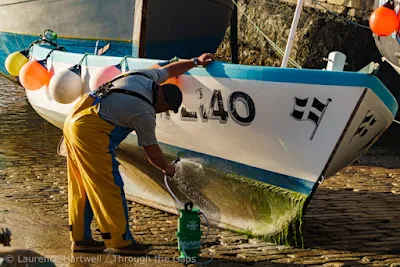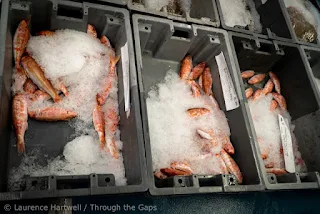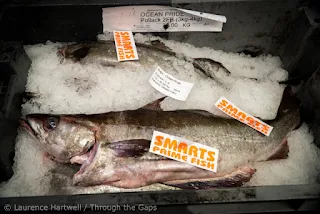Welcome to Through the Gaps, the UK fishing industry's most comprehensive information and image resource. Newlyn is England's largest fish market and where over 50 species are regularly landed from handline, trawl, net, ring net and pot vessels including #MSC Certified #Hake, #Cornish Sardine, handlined bass, pollack and mackerel. Art work, graphics and digital fishing industry images available from stock or on commission.
Friday 28 January 2022
You're fried! Final #FishyFriday in January
Thursday 27 January 2022
Spend a few minutes and help contribute to the Marine Plan monitoring survey for the South West.
The Marine Management Organisation (MMO) is required to monitor marine plans under Section 61 of the Marine and Coastal Access Act (2009).
Wednesday 26 January 2022
New! Out-of-water inspections of small fishing vessels.
The regulatory body wants fishermen to take advantage of the advice and guidance on offer ahead of their next inspection, so they are prepared for the changed requirements.
The updated ‘Code of Practice for the Safety of Small Fishing Vessels of Less than 15m LOA (Length Overall)’ came into force on 6 September, 2021, and strengthened the minimum safety requirements that vessels are expected to meet to obtain a small fishing vessel certificate.
The new requirements are part of a concerted effort to boost safety standards in the industry – following the news that 10 UK commercial fishermen lost their lives in accidents at sea last year.
The requirements include minimum safety rules on construction, watertight and weathertight integrity, stability, machinery and electrical equipment, fire protection, crew protection and life-saving appliances. In addition, an inspection is now in two parts, with a surveyor required to inspect a vessel both in and out of the water.
“The biggest change is the out-of-water inspection (as well as the in-water inspection) of a vessel for the safety certification.
“Failure to prepare or present a vessel will mean the surveyor is unable to complete the safety checks. “There have been a few examples where it is clear the new rules have not been looked at, and surveyors are finding that not everyone is fully compliant with the requirements of the updated code. “It is a more comprehensive safety inspection than ever before. The checks may take longer than they used to, but they can also be completed on two days, to accommodate the out-of- water inspection. “And fishermen have up to a year after their in-water inspection to get the out-of-water done. “An inspection remains free.”
Paul Scotter warned, however, that fishermen’s certificates will not be valid if they don’t get their out-of-water inspection done in the timeframe stipulated.
“The first port of call is to look at the guidance online for applying the code, to ensure you are familiar with the requirements – but if there are any questions, talk to your local Marine Office,” he added. “We are doing what we can to help, answering queries and providing advice. Once an inspection is arranged, we’re sending out links to further guidance. “We don’t want to have to fail a vessel at inspection, and we don’t want to stop fishermen from doing their jobs. “We are here to make sure the vessels – and the fishermen onboard – return to shore safe and well. Our inspections are vital to ensuring a basic level of safety, something most of the industry is behind and supportive of.”
Paul Scotter said that the majority of fishermen are already ‘up to code’, and have been for years.
He added: “This is as much about the MCA reflecting the growing standards in the industry as that the overall benchmark for safety has gone up.”
Guidance on the new code can be found here.
Tuesday 25 January 2022
Who wants the disappearance of fishermen?
On the occasion of this 22nd World Fishermen's Day (JMP) initiated on November 21, 1997 in New Delhi, in the presence of representatives of French artisanal fishing, the Fishing and Development Collective is sounding the alarm.
In recent months, worrying signs have multiplied indicating a desire, sometimes obvious, to make fishermen disappear or, very often, to marginalise them to make way for more lucrative activities in the blue economy.
- The European Union, in its strategy for the blue economy, excludes fishing, which has been denounced [ 1 ] by several organizations, including the Collective on the occasion of the JMP in November 2019. It has just planned a considerable extension offshore wind farms without a clear answer to the problem of cohabitation with fishing [ 2 ] over the thousands of km2 concerned (3% of European marine areas, but mainly in the coastal zone, therefore in the busiest fishing areas).
- In May 2019, a famous British journalist from the Guardian, George Monbiot, called for an end to fishing, the only way he believed to protect the oceans [ 3 ] , while vegans (L 214) called fishermen slaughterers and celebrated at the end of March the day for the end of fishing, with good relays in the press.
- At this very moment, the WTO is preparing the end of the discussions on fisheries subsidies within the framework of the mandate entrusted to it by the United Nations for the implementation of Goal 14 of the Sustainable Development Goals on the oceans. The representatives of small-scale fishermen have never really been involved in these discussions, which will nevertheless have a considerable impact on their activity [ 4 ] .
In France, the Citizen's Climate Convention has proposed "to avoid fishing fish in their natural environment" and replace it with sustainable aquaculture [ 5 ] . Aquaculture is however an old moon which has already shown its limits.
IUCN is actively preparing for January 2021, in Marseille, its congress which will be largely devoted to the protection of the oceans by extending Marine Protected Areas to 30% of the oceans, including 10% in integral reserves. All this will find its translation in the Convention on Biodiversity in a valuation of ecosystem services: "The net benefits of protection of up to 30% range from a minimum estimate of $490 billion and 150,000 full-time jobs in MPA management at the most optimistic of $920 billion and over 180,000 jobs by 2050" [ 6 ]. A reserve of 30% of the oceans is therefore clearly envisaged. It should be added that some scientists are calling for a ban on fishing in international waters, ie 60% of the oceans. Fishermen's representatives are not involved in these decisions.
Since September this year, the organisation Sea Shepherd has been harassing fishermen day and night in the Bay of Biscay denouncing a "massacre of dolphins" based on a few videos of dead dolphins in nets. These images immediately led to a reaction from the European Commissioner in charge of fisheries in response to the request from environmental NGOs for a 4-month fishing stoppage in the Bay of Biscay. The impact of these images, not contextualised, is devastating because today's society does not accept the death of cetaceans. A single photo of dolphins in driftnets for tuna and a campaign by Greenpeace in the 1990s quickly led to a decision by the United Nations to ban the use of driftnets; an aberration for all anglers. Sea Shepherd is in fact fighting for an end to all fishing and with these images will not stop harassing fishermen to put pressure on elected officials who feel unable to resist due to the emotion felt by the general public. Already, after a few weeks of harassment, fishermen have cracked, some have made inexcusable remarks while some, in the Bigouden country, have already decided to put their boat up for sale. They sense that the battle for public opinion is lost and feel misunderstood by a society increasingly cut off from the realities of fishing.
- It is worrying to see the European Commission rushing to react to the injunctions of ENGOs when it knows perfectly well that this problem has always been part of the realities of fishing and that dolphins are in no way threatened as a species; their number is estimated at 634,000 individuals in the NE Atlantic. Like seals, the more numerous they are, the more complicated coexistence becomes.
- It is worrying to see the European Commission rushing to react to the injunctions of ENGOs when it knows perfectly well that this problem has always been part of the realities of fishing and that dolphins are in no way threatened as a species; their number is estimated at 634,000 individuals in the NE Atlantic. Like seals, the more numerous they are, the more complicated coexistence becomes.
- It is worrying to see the European Commission rushing to react to the injunctions of ENGOs when it knows perfectly well that this problem has always been part of the realities of fishing and that dolphins are in no way threatened as a species; their number is estimated at 634,000 individuals in the NE Atlantic. Like seals, the more numerous they are, the more complicated coexistence becomes.
Like Le Collectif Pêche & Développement, geographers, historians, economists and anthropologists, some international NGOs and world forums of artisanal fishermen denounce these abuses and this contempt for fishermen.
We are witnessing at sea, with the stranglehold of environmental NGOs on MPAs, the same phenomenon denounced by the historian Guillaume Blanc, in his book "Green Colonialism": the grabbing of land in Africa, in particular by the stranglehold of NGOs environmentalists on National Parks, and which provides a pretext for the expulsion of indigenous peoples, considered incapable of managing their ecosystem. However, these reserves for more than a century have not been enough to solve the biodiversity crisis on land.
This is the case with the evolution of the marine world towards a "Blue colonialism" which is shamelessly displayed, multiplying MPAs prohibited to fishing, a subsistence and eminently sustainable practice of many oceanic peoples, and which, in Europe and elsewhere , only rarely involves small-scale fishermen in decisions about the oceans, of which they are nevertheless secular managers.
Our elected officials must react:
Faced with this accumulation of threats to the very existence of fishing, the Fishing and Development Collective asks elected officials to commit to:
- Recognize the collective ability of fishermen to co-manage their resources and protect the environment provided their rights and responsibilities are recognized, as shown by the restoration of the red lobster stock.
- Recognize the need to fish to feed the population with quality products, important for health (omega3) and with low environmental impact compared to farmed products.
- Involve fishermen and their representatives at all decision-making levels from local to global.
- Recognize the specificity of their culture and the richness of their knowledge, essential to safeguarding the oceans.
- To bear witness to these commitments on the occasion of each World Fisherman's Day by organising in all the communities concerned with fishing and shellfish farming (municipalities, departments, regions) an event recalling that fishermen carry out an essential activity in difficult conditions the good of all. That the State finally formalises this Day, as is the case in many countries of the world.
Under these conditions, there will always be men and women ready to invest themselves in this fascinating profession and to confront the risks of the sea. They will also be able to commit to meeting the expectations of society and to pursuing their commitments. for sustainable fishing, based on the voluntary guidelines of the FAO and its charter of good fishing practices.
Fisheries and Development Collective 183, Fisheries and Development Bulletin n°183, December 2020 | Blue Economy World Fisherman's Day
November 21, 2020
[ 1 ] Appeal to the European Commission: an inclusive ocean strategy is needed to ensure sustainable fishing communities https://peche-dev.org/spip.php?article276
[ 2 ] https://lemarin.ouest-france.fr/secteurs-activites/energies-marines/37737-la-commission-europeenne-vise-340-gw-denergies-marines-en 2050
[ 3 ] Alain LE SANN. Stop fishing to save the oceans? https://peche-dev.org/ecrire/?exec=article&id_article=250
[ 4 ] WFFP, WFF. Declaration on the Sustainable Development Goals (SDGs) and on the UN Ocean Conference https://peche-dev.org/ecrire/?exec=article&id_article=157 , see also https://peche-dev .org/write/?exec=article&id_article=319
[ 5 ] Alain LE SANN. Does the Citizens' Convention call for an end to fishing? https://peche-dev.org/spip.php?article309
[ 6 ] IUCN. Large-scale Marine Protected Areas, Guidelines. 2017
[ 7 ] Llamado a la Comisión Europea: se necesita una estrategia inclusiva para los Océanos para garantier comunidades pesqueras sustenibles https://peche-dev.org/spip.php?article276
[ 8 ] https://lemarin.ouest-france.fr/sectors-activites/energies-marines/37737-la-commission-europeenne-vise-340-gw-denergies-marines-en-2050 _
[ 9 ] Alain LE SANN. ¿Dejar de pescar para salvar los oceanos? https://peche-dev.org/ecettre/?exec=article&id_article=250
[ 10 ] WFFP, WFF. Declaration on the Objectivos de Desarrollo Sostenible (ODS) and on the Conferencia Oceanica de la ONU https://peche-dev.org/ec Escribir/? Exec=article&id_article=157, ver también https: // peche-dev .org / write /? exec=article&article_id=319
[ 11 ] Alain LE SANN. ¿La Convención Ciudadana pide el fin de la pesca? https://peche-dev.org/spip.php?article309
[ 12 ] IUCN. Protected marina areas in gran escala, Guidelines. 2017


















































